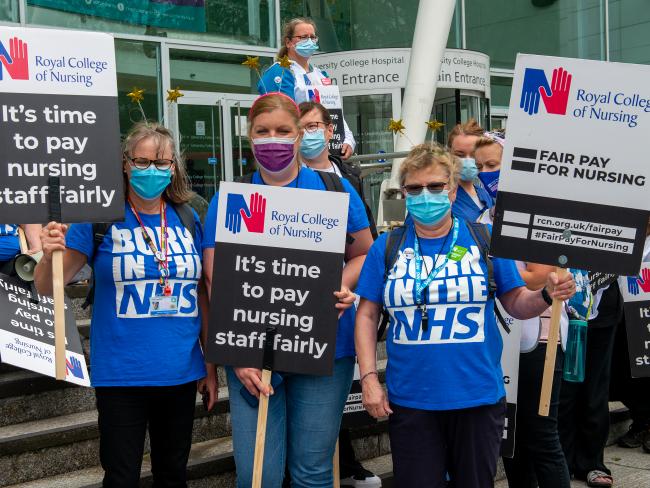8 December 2022

University College Hospital, London, 3 July 2021. RCN members on the 73rd anniversary of the NHS calling for better pay and improved patient safety. Photo John Gomez / Shutterstock.
Nurses are about to take strike action on two days this month in pursuit of better pay. This is a significant step. It will be the first time in its 106-year history that the Royal College of Nursing has taken national strike action.
Nurses across England, Wales and Northern Ireland will be on strike on 15 and 20 December. This reflects a change of thinking in nurses’ view of how they can defend themselves and their patients. It marks a realisation that the way they’ve traditionally coped in response to poor pay and staff shortages has not worked.
Message
The message for the public is straightforward: “The dispute is over pay, but also patient safety. Staffing levels are so low that patient care is being compromised. Only by paying nursing staff fairly will we recruit and retain people in our profession.”
The RCN pay claim is straightforward too – a pay rise of 5 per cent above RPI inflation to reflect the extent to which nurses’ pay has lagged behind inflation since 2010, and behind average pay growth in both the public and private sectors. The RCN estimates that experienced nurses are 20 per cent worse off over that period – in effect a pay cut.
Misleading
The government released a misleading graph in early December attempting to contradict this position. Andrew Gwynne, shadow minister for public health, responded with a complaint to the UK Statistics Agency. He said, “With inflation at 11.1%, it is disingenuous to claim that nurses have been awarded a pay rise, when in fact the average pay of a nurse has fallen by 8% since 2010. A recent analysis found that the real-terms salary of an experienced nurse has fallen by 20% in the same period.”
The head of the UKSA, Robert Chote, did not accept this. In reply he thought it “…perfectly reasonable to debate whether cash or real-terms figures are a more appropriate basis for comparison”! But he did point out that the chart was “…a poor and misleading representation of the underlying data that risks damaging public confidence in the presentation of official statistics…”.
No doubt government misinformation will continue as the dispute continues. The RCN and their members will be prepared to counter that and to explain to the public that decent pay is essential but only part of the picture.
Staff shortages
The role of pay in retaining experienced staff is crucial, but nursing staff shortages are high and increasing. In the year to June 2022, 40,365 NHS nurses in England left active service, over 11 per cent of all NHS nurses. This is a large jump from the previous year (32,269) and over 6,000 higher than the previous peak in 2017.
Over 44,000 nurses joined the NHS in the year to March 2022, a record high. But unless the exodus of experienced staff is halted, the effort to recruit and train them will be wasted.
'Nurses are making their voices heard in this dispute.’
Nurses are making their voices heard in this dispute. They acknowledge that their previous ways of coping have exacerbated the patient safety problem, even though ultimately nurses have not caused it.
Hoping better pay will turn up eventually, working well beyond paid hours, or leaving the profession have all been detrimental to nurses themselves and a risk to patient safety. And in turn this approach has done little to improve the recruitment and retention of nursing staff.
It’s understandable why nurses leave the profession for better paid and less stressful jobs but eventually that’s counterproductive to patient safety. Others resign their permanent post and work for an agency. That can reduce their own personal stress but it exacerbates stress for others and breaks the continuity of patient care. And ultimately the lack of pensions and other benefits can leave individual agency nurses the poorer.
Agency costs
The NHS has spent over £4 billion in the last five years to plug nursing staff gaps with costly agency nurses. The main beneficiaries are the agencies, not the nurses, their patients or the NHS. A study commissioned by the RCN found that covering vacancies costs far more than permanent staff – for each vacancy, £21,000 a year for agency nurses and £5,000 for NHS temporary vacancy cover (bank nurses). Meeting the RCN claim in full would cost far less.
Nurses also voted for strikes in Scotland, where numbers leaving the NHS are also at a record high. They suspended action when talks reopened with the Scottish government and are now balloting on an improved pay offer.
On 8 December RCN general secretary Pat Cullen called on Steve Barclay, the health secretary, to reopen formal pay negotiations, pointing to further evidence that nurses’ pay has fallen behind – this time from the Organisation for Economic Co-operation and Development.
Skirmishes
There have been some important early skirmishes in this battle. As well as the desperate attempt to discredit nurses by publishing distorted information, they have been baselessly maligned by the Chairman of the Conservative Party, Nadhim Zahawi. He said that NHS nurses going on strike is “exactly what Putin wants to see”; a claim that was rightly met with ridicule.
However, there should be no doubt that the government is serious in opposing pay increases. It will be ruthless in its attempts to suppress industrial action in essential services. There is an onus on all workers to demonstrably show their support for nurses in this battle.
